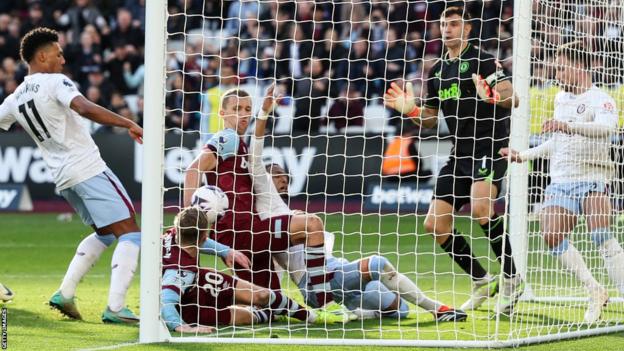

Referees’ chief Howard Webb has said the video assistant referee was right not to interfere as Liverpool were not given a late penalty in their recent 1-1 draw with Manchester City.
City winger Jeremy Doku caught Alexis Mac Allister with a high boot in the area in the final seconds of the match.
But on-field referee Michael Oliver did not award the Reds a spot-kick, and VAR Stuart Attwell agreed.
“It’s split a lot of opinion, hasn’t it?” said Webb.

Howard Webb
“It’s one of those, for sure – if the referee gives it on the field, it would have been a ‘check complete’ by the VAR.
“Equally, having not given it, it’s also ‘check complete’. You hear Michael Oliver say the ball’s in between two players going together.
“The ball is too low to head. Doku lifts his foot to play the ball, and he does make contact on the ball.
“And yes, we know there’s some contact on Mac Allister as well. Mac Allister comes into him. Mac Allister is not really playing the ball either. So, I understand why it’s split opinion.”
Liverpool manager Jurgen Klopp and Mac Allister both felt the challenge should have resulted in a penalty for their side.
“The VAR stays out of it. I think that is what we would we would expect,” added Webb on Match Officials Mic’d Up, a Premier League Productions programme which analyses VAR decisions from previous games.
“The VAR looks at it and doesn’t see a clear-and-obvious situation. You see something that’s pretty subjective and therefore stays out of it, and the feedback we’ve had from people within the game is that this is a pretty subjective situation. It’s split opinion.
“So on that basis, the VAR, working to that high threshold kind of followed the right course in not getting involved.”
Webb previously said that Liverpool should have had a penalty in December’s 1-1 draw against Arsenal, while the Reds were also on the wrong side of a decision when VAR wrongly ruled out a Luis Diaz goal in a 2-1 defeat by Tottenham – an error acknowledged by referees’ governing body PGMOL.
On the show Webb was also asked about the time VAR decisions are taking and said the average length of check is 38 seconds “normally completed before the game even restarts after a goal is scored or penalty is awarded”.
He added that delays due to the VAR when the game has to stop “comes out just over a minute on average per game”.
Webb added: “We’re always working to be as efficient as we can be. We go through training sessions where we’re working on accuracy first and foremost, but also speed, embedding some good processes.”
The Hammers thought they had scored a late winner against Villa in their 1-1 draw when Tomas Soucek got on the end of James Ward-Prowse’s free-kick, which appeared to strike team-mate Jarrod Bowen before going in.
Referee Jarred Gillett awarded the goal but, after VAR Tony Harrington recommended it be disallowed for a Soucek handball after a lengthy check that took more than five minutes, Gillett reviewed the incident on a screen and agreed it should be chalked off.
“It was quite a complicated sequence, wasn’t it, with quite a lot going off?” said Webb.
“When the guys look back on this one, they’ll see some areas where they could be a bit quicker and speed this process up a bit.
“This is a situation of the player that’s assisting (Soucek) deliberately bringing their arm forward in the opinion of the VAR, but that’s a subjective matter and that’s why the referee goes to the screen and makes the final decision.
“So, a correct outcome, it just took a bit of time to get there.”

Another late decision that went against West Ham took place against Burnley when the Hammers came back from 2-0 down to draw 2-2.
But they were denied a penalty after the ball hit Clarets midfielder Sander Berge’s hand.
VAR Andy Madley looked at the incident and a penalty was not awarded because Berge had headed the ball onto his own hand when attempting to clear it.
“To be clear, this cannot be handball,” said Webb.
“Berge heads the ball onto his own arm. The laws of the game are quite explicit in that if a player plays the ball onto his own arm, it can’t be a handball offence.”
Villa were 2-0 down to Tottenham when John McGinn made a late tackle on Spurs left-back Destiny Udogie.
Referee Christopher Kavanagh showed the Scotland midfielder a red card and VAR Tim Robinson confirmed the decision.
“What we do see is McGinn take a really strong sort of kicking action into the opponent and the law only asks us to identify whether the action has excessive force or brutality,” added Webb.
“And this one I think clearly does. The officials did as well.” – bbc.com